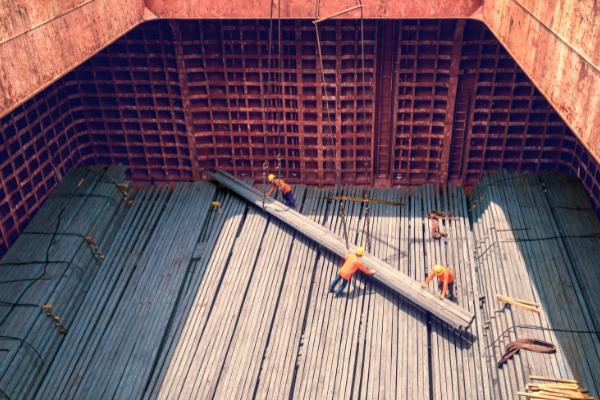
Steamship Mutual
Published: August 09, 2010
August 2005
In a recent London arbitration*, the Tribunal was presented with the facts of a case involving a dispute between owners and charterers over the time taken to bring the vessel's holds to a good enough standard to load a cargo of wheat.
The vessel was fixed to charterers for a period charter on an amended NYPE form. In April 2004 the vessel was fixed by the charterers to load a cargo of copper cathodes at a port in Chile for discharge at Dunkirk in France. The charterers then fixed the vessel to load a cargo of wheat at Dunkirk for discharge in West Africa.
Following discharge of the copper cathodes, the vessel was obliged to shift from the berth to an outer anchorage for hold cleaning operations. The hold cleaning that followed was carried out over approximately 24 hours. The cleaning was made difficult due to the vessel rolling as a result of being exposed to open seas. The crew used a high pressure hose to remove residues of the previous cargo from various locations including bulkheads and from underneath hatch covers. As a result, loose rust and paint flakes were dislodged necessitating further washing and sweeping and the vessel was not passed as suitable to load the wheat cargo.
Following further cleaning carried out over a period of approximately 48 hours after the first inspection, the vessels holds were passed as suitable for the loading and carriage of the wheat cargo.
The issue of the time taken to carry out the cleaning operations was referred to arbitration in London under the LMAA Small Claims Procedure.
The charter party provided as follows: -
Clause 1
"That the Owners shall…maintain her class and keep the vessel in a thoroughly efficient state in hull, holds, machinery and equipment for and during the service."
Rider Clause 50
"During the Charter period the crew, in Charterer's option, are to perform ordinary hold cleaning and the Charterers are to pay a lumpsum of USD2,000 to the Owners for each such intermediate hold cleaning operation. The crew shall endeavour to clean the holds to the best of their capabilities but the Owners and/or crew not to be held responsible for any/all consequences, damages, costs or liabilities arising from such hold cleaning by the crew including but not limited to failure of hold cleanliness test and/or failure to conform to shipper's cargo surveyor's standards, etc…."
Charterers argued that the Owners were in breach of maintenance obligations as set out in clause 1. Specifically that the cleaning that was required went beyond normal cleaning and that the measures required to bring the vessel to a standard suitable to carry the wheat cargo were in the nature of maintenance and/or repair. Accordingly they claimed damages for the time lost and argued that they were entitled to deduct from hire by way of the principle of equitable set-off. Charterers raised an alternative argument that they were entitled to treat the vessel as being off-hire by reason of Clause 15 (the off-hire clause), the condition of the holds being a cause preventing the full working of the vessel.
Owners disputed this, arguing that there was no evidence that the crew were doing anything other than normal hold cleaning, and so charterers had not established that there was a breach of clause 1. Owners also argued that the situation fell squarely within the provisions of rider clause 50, such that they were exempted from any liability, including failure of hold cleanliness test, arising out of hold cleaning carried out by crew. In view of a lack of breach by the owners of clause 1 and/or 15, owners argued there was no right to deduct from hire either under clause 15 or under the principle of equitable set-off.
Based on the evidence and submissions that had been put forward, the Tribunal took the view that in order for the charterers to succeed, they would need to establish one of the following. First, that the crew had not used their best endeavours to clean the cargo compartments as required under clause 50. Given the conditions that the crew were working under, the Tribunal found no breach of the owners obligations under clause 50. Alternatively, the charterers would have to establish that the condition of the vessel was such that mere washing and cleaning was not enough to bring the vessel to the required standard, so that there was a breach of maintenance obligations under clause 1. The Tribunal held that having successfully carried out all of the cleaning and washing that was required to bring the vessel to the required standard, it was apparent that what the crew was doing was indeed the sort of cleaning that was envisaged by clause 50. There was no evidence to suggest the crew ought to have to use specialized equipment to clean the holds. If there had been a breach of the maintenance obligations, then something more than crew cleaning and washing would have been necessary, and that was not the case. Furthermore, the fact that the further hold cleaning that was required after the failure of the first inspection took around 48 hours was not unusual in the context of a 23 year old vessel.
Often, owners had the opportunity of having a ballast voyage between the previous discharge port and her grain loading port. This would normally give enough time for appropriate hold cleaning to take place, assuming sea conditions allow it. In the present case, the vessel was fixed to load the grain cargo at the same port at which she had discharged her previous cargo, and this highlighted the time taken. In all the circumstances, the Tribunal found that the time taken was not unreasonable and the charterers' claim therefore failed.
The decision is useful as guidance as to how clauses in similar terms to Clause 50 might be interpreted.
*London Arbitration 11/05


